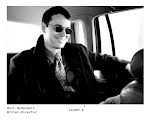_ - - _ $$
Charles Ferguson who made the very clear-eyed
No End in Sight, a documentary which showed the
problems of the Iraq war before the view became
fashionable, has a new doc coming out about the
Alan Greenspan - Hank Paulson financial meltdown
from which now we're still trying to recover.
His doc is called Inside Job, and from the trailer one
can see that like Nassim Nicholas Taleb (The Black
Swan) - but using a different set of evidence - he
believes that the meltdown was plainly foreseeable,
to the players who brought it on. (Or in Taleb's terminology,
this seeming Black Swan was not really a Black Swan.)
Ferguson was one of the first filmmaker's to express
support for my NIGHTINGALE IN A MUSIC BOX,
and I am sure this will be a fascinating study in many
ways. I am looking forward to seeing the movie
and urge anyone who wants to understand the crisis
to go see it. At the same time I hope in his desire
to tell the truth about the money-players who made
so much money while destroying so many people's
lives, he doesn't overlook our own culpability in
what happened to us.
As much as we would like to blame only
Wall Street for our current problems, a usually
overlooked root cause of the meltdown and crisis
is that as Americans we love success.
Our ancestors came here looking for some form
of success; and usually finding it in a different
form than they originally imagined, we as a
people have come to accept and value success
in whatever form it comes: wealth, attention
or even actually achieving something which
helps others.
The one thing we rarely do is question success.
When someone is successful, we rarely ask why.
We usually credit the other person as the source
of his success and never ask if perhaps luck or
unscrupulousness or even weakness in the face
of peer pressure was the cause of his success.
Yes, in the run up to the Greenspan-Paulson meltdown,
personal weakness of character in the face of peer
pressure - in this case peer pressure took the form of
other people's success - led to great wealth.
Many in the financial industry realized the sub-prime
mortgage market was based on a rotten foundation
and therefore bound to fall, but the enormous sums of
money their peers were making created an anxiety about
being left out which led all but the most asocial
traders or most self-confident and self-sufficient money
managers on a dance of short term gain and long term
destruction.
The famous quote by Citicorp's Chuck Prince that
"We have to keep dancing until the music stops"
makes it pretty clear that many in financial industry
knew that (in the words of the Squirrel Nut Zippers)
"in the morning there'll be Hell to pay."
But what if they were wrong?
Or what if they were right but others, the
unscrupulous, made out like bandits while they,
the clear-eyes seers of truth, were left out in the
cold ?
The success of others - especially if we view them as
peers - is too strong for most of us to resist, even if
we know the success may be built on shaky ground.*
As Americans, we believe that nothing succeeds like
success. Success is self-justifying until it blows
up in our face, revealing a cost we really weren't
prepared to pay. At this point it becomes easy to draw
the conclusions which we could have come to earlier,
if only we were less enthralled with the successful,
if only we were willing to question success while the
answers might still do us some good.
* To view this from another perspective, see Dan
Ariely's psychological explanation of this process,
especially paying attention to the 11th and 12th
minutes of this fascinating video.
/:/) $
Subscribe to:
Post Comments (Atom)

No comments:
Post a Comment